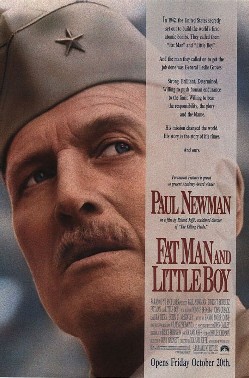The movie was directed and co-written by Roland Jaffe (“The Killing Fields”). He had a mock-up of Los Alamos built in Mexico. It consisted of 35 buildings and cost more than $2 million. Paul Newman (Gen. Leslie Groves) and Dwight Schultz (Robert Oppenheimer) played men who were the opposite of their own political philosophies. The movie failed at the box office in America and was renamed “Shadow Makers” for foreign distribution.
The movie begins at the Pentagon in Sept., 1942. Army Corps of Engineers Col. Leslie Groves built it. He is now unhappily tasked with heading the Manhattan Project. Great, instead of engineers, he now has to work with scientists! But when FDR tells you that you could win the war… He goes to Chicago to meet the physicist Leo Szilard. The meeting takes place with the genius scientist sitting in his bathtub. This marks the beginning of Groves’ hair-pulling. And his inkling of what he has gotten himself into. Szilard tells him that a small amount of uranium could blow up Chicago. Groves chooses Oppenheimer to head the scientific end of the project. It’s a classic cats and dogs scenario. But they have to work together to defeat the wolves. Oppenheimer is your smug egghead who is confident he will dominate this troglodyte. At Los Alamos in April, 1943, Groves gives a speech to the scientists about harnessing their potential to create the “device”. Duh, Generalissimo. Oppenheimer will act as a buffer between the scientists and the military. Unfortunately, that go-between is your classic liberal, or as they were called back then – commie. (Now that I think about it, times haven’t changed that much.) And Oppenheimer is literally in bed with a communist. Thus commences the soap opera adjuncts to the scientific experimentation. The science thread is threadbare as we jump past most of the experimenting and chalk board calculating to discussion of wrong versus right. The scientists debate the ethics of using the bomb, especially now that the Nazis are defeated. Groves’ part of the debate is to yell “finish the damned thing!” Spoiler alert: they do.
“Fat Man and Little Boy” is a misfire, unlike the bomb. Like the bomb, it is a bomb. It should have a been a docudrama, but instead we get a soap opera with historical accuracy problems. The soap opera crowds the scientific efforts into the corner. Don’t get me wrong. I know shaped charge versus shotgun design would seem boring to your average movie-goer, but why do we get lame drama instead. The movie gives us both Oppenheimer having his affair with a commie and a romance between a nurse (Laura Dern) and a fictional scientist (John Cusack) to add melodrama. And then once the scientific challenges are accomplished, we get revisionist hand-wringing by the scientists. The movie concludes with the Trinity Test, so follow it up with “Barefoot Gen” and then decide which of the movie scientists were right.
The big drawing card for the movie was Paul Newman as Groves. Most Americans would not have known that he was too old, and thin, to play the part. And most Americans today, don’t even know who Groves is, so this is not a drawback. And I don’t care that much whether actors look the part. Just cast the best available. And they did. But the acting is not good from a fine cast. Cusack is a good actor too, but he is stuck in the “bring in the younger crowd” role which is also the get that crowd to cry role. And the cast is given trite dialogue to go along with the timeworn plot developments.
There should have been a way to make the greatest scientific effort in human history interesting without dumbing it down so much. And without greatly exaggerating the conflict over whether the bomb should have been dropped. But who am I kidding, we’re talking Hollywood here.
GRADE = D

I don't mind a "communist in the A-Bomb program" subplot, as communist sympathizers did in fact transfer nuclear secrets to the Soviets, changing the course of world history (for the worse, I believe). I agree that this could have been a better movie if the writers had tried to show the real historical issues instead of creating melodrama. It might work for an Opera (and I will admit that some movies are able to pull off operatic scenes) but it doesn't work here.
ReplyDeleteI think maybe soap opera would be closer to the plot. I see your point about Soviet spy. Klaus Fuchs would be a good example of that.
Delete